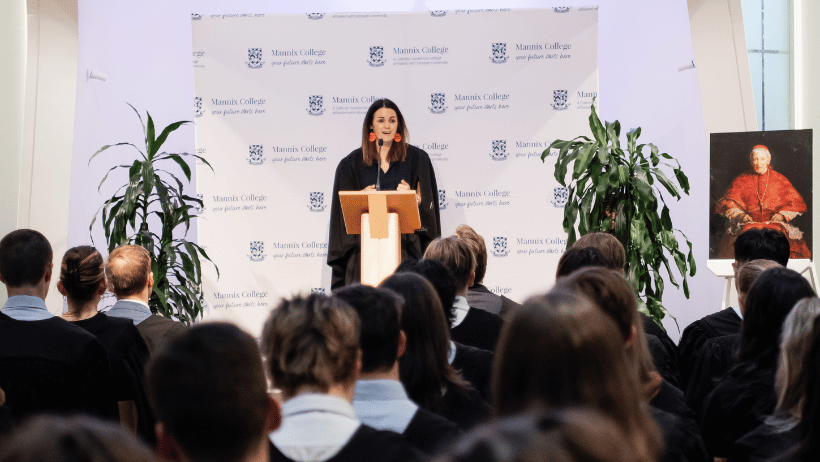Empowering Progress: Newman Lecture Sparks Conversations on Gender Equality

The 2023 Newman Lecture was delivered on August 23 by Professor Kate Fitz-Gibbon on the topic, “Progressing Gender Equality in Australia: Why it matters and why we must accelerate current efforts.”
Named in honour of Saint John Henry Newman, the Newman Lecture at Mannix College is a major annual event that attracts eminent speakers to address the challenges of the day.
In 2023, the student leaders of Mannix voted that the lecture address gender equality. The College was thrilled to have Professor Fitz-Gibbon, Chair of Respect Victoria, deliver the lecture to 300 residents, staff, alumni, donors and guests in St Dominic’s Chapel.
As the Director of the Monash Gender and Family Violence Prevention Centre, Professor Fitz-Gibbon highlighted the importance of accelerating efforts to address gender inequality in Australia and worldwide. Read the full lecture.
Here are the key takeaways from her impactful speech:
1. Acknowledging Indigenous Peoples and First Nations Leaders: Fitz-Gibbon began by acknowledging traditional owners and expressed gratitude for the knowledge she gained from First Nations leaders working to combat domestic, family, and sexual violence. She emphasized the importance of learning from their experiences.
2. Gender Inequality is Real: Fitz-Gibbon stressed that gender inequality is a tangible reality in everyday experiences. She highlighted disparities such as the gender pay gap, unequal representation in leadership roles, and women’s financial insecurity in retirement.
3. Global Gender Gap: Fitz-Gibbon shared the World Economic Forum’s analysis, which revealed that at the current pace of progress, it could take 131 years to achieve global gender parity. Australia’s ranking in gender equality has fluctuated over the years, indicating the need for greater efforts in this domain.
4. Workplaces as Agents of Change: Workplaces are pivotal in promoting gender equality and supporting domestic and family violence victims. Fitz-Gibbon discussed how workplace policies, such as paid family violence leave, can support victims and hold perpetrators accountable.
5. Impacts of Domestic Violence: Fitz-Gibbon highlighted the immediate and long-lasting impacts of domestic and family violence, emphasizing that these issues extend beyond physical harm to emotional and psychological effects. She underscored the need for workplaces to foster environments where victims feel safe seeking help.
6. Funding and Leadership: Fitz-Gibbon called for substantial funding to address domestic violence and gender inequality. She stressed the importance of housing options, specialized services, and prevention efforts. Leadership committed to change and financial support is crucial to addressing these challenges effectively.
7. Individual and Collective Action: Fitz-Gibbon encouraged individuals to challenge disrespect and sexism, fostering a culture of equality. She emphasized that even small actions contribute to changing attitudes over time. Furthermore, she stressed the collective responsibility of workplaces and governments to drive meaningful change.
Professor Fitz-Gibbon’s lecture highlighted the pressing need to address gender inequality and violence against women. Her insights underscored the importance of collective efforts, informed policies, and a commitment to creating a safer and more equitable society. Read the full lecture.
“We need leadership that commits with heart, mind and wallets to secure the safety of all persons, and to meaningful progress the attainment of gender equality.” – Professor Kate Fitz-Gibbon
.
[foogallery id=”13878″]
.
A Formal Dinner with an expert panel of Monash University staff and Mannix Old Collegians followed the lecture, offering insights into the essential roles that individuals, businesses, universities and residential colleges must play in improving gender equality for the benefit of all. Moderated by current resident Fletcher Smith, the panel comprised Fiona Marshall, Bailey Webb, Kelsey Paske and Professor Kate Fitz-Gibbon.
During the dinner, the atmosphere buzzed with lively exchanges revolving around gender equality. Adding to the vibrancy of the evening was a captivating panel discussion, assembling a diverse group of accomplished experts. This panel delved deep into the multifaceted dimensions and diverse perspectives shaping gender equality in society.
The Dining Hall was adorned in orange for the event, which united the gender equality theme with a powerful message against violence. As chosen by the United Nations, orange symbolizes hope for a brighter, violence-free future, with it being the colour of the International Day for the Elimination of Violence against Women. Just as gender equality aims for fairness, orange embodies a world where safety and respect prevail.
As the night ended, a palpable sense of inspiration and renewed commitment could be felt around the audience of 300 residents, alumni, donors and guests. The event served as a testament to the profound impact of open discourse and shared experiences in driving progress on the frontiers of gender equality.
“Professor Fitz Gibbon’s enlightening address and the following panel underscore the indispensable role colleges and university communities must play in championing gender equality. We can forge a future marked by true inclusivity and empowerment through compelling dialogues that drive action.” – Principal Andrew Swan
About Professor Kate Fitz-Gibbon
Professor Kate Fitz-Gibbon is Director of the Monash Gender and Family Violence Prevention Centre, a Professor of Social Sciences in the Faculty of Arts, Monash University (Victoria, Australia) and Deputy Director of the ARC Centre of Excellence for the Elimination of Violence against Women (CEVAW). She also holds affiliated research appointments with the School of Law and Social Justice at the University of Liverpool (UK) and the Research Center on Violence at West Virginia University (US).
Kate’s qualifications include a PhD in Criminology (2012), Master of Human Rights Law (2019), Graduate Certificate of Higher Education (2013) and she is a Graduate of the Australian Institute of Company Directors. Kate is an internationally recognised scholar in the field of family violence, femicide, responses to violence against women, and the impact of policy and practice reform in Australia and internationally. Her research findings have been published in leading academic journals and books.
Kate has advised on homicide law reform, family violence and youth justice reviews in several Australian and international jurisdictions. The High Court of Australia has cited her research. In 2021, Kate was appointed Chair of Respect Victoria by the Victorian Government.
